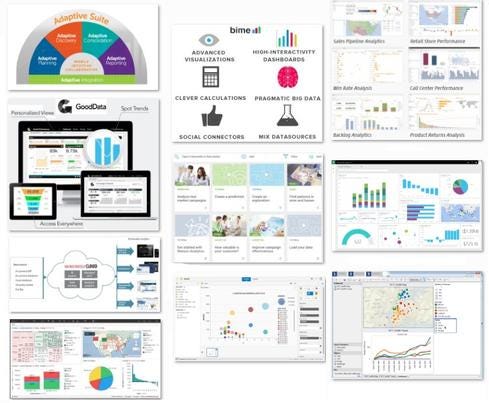How Data Restrictions Hurt The Global EconomyHow Data Restrictions Hurt The Global Economy
Many countries are creating policies to restrict the flow of data, driven by privacy or protectionist concerns. Such limits could stifle economic growth.
March 3, 2015


10 Cloud Analytics & BI Platforms For Business
10 Cloud Analytics & BI Platforms For Business (Click image for larger view and slideshow.)
It has taken only 20 years for the Internet to revolutionize global commerce and for data to become the digital lifeblood of the world's economy, coursing through the mobile Web and creating limitless global opportunities for innovation, social benefit, economic growth, and individual advancement.
But an alarming trend is developing around the world as some nations seek to constrict the flow of this data. If the trend continues, these countries are likely to do more harm than good and almost certainly will limit -- and may even eliminate -- the many opportunities for global prosperity now before us.
A new study conducted by the Business Roundtable found that online data exchanged across national borders increased by a factor of eighteen between 2005 and 2012 and predicted an additional eight-fold increase by 2025. The economic and social benefits resulting from this data explosion are manifold, with stakeholders in every sector and country around the globe the beneficiaries.
Sharing data across national borders allows business to communicate with remote sites, suppliers, workers, and customers, thereby enhancing productivity and reducing environmental footprints. It allows governments to better deliver services to their citizens, from smarter energy to cleaner air. And it lets individuals benefit from these innovations and participate in the global economy in previously impossible ways.
Machine-to-machine technologies let fleet operators see how best to deploy their vehicles to save money. Intelligent transportation systems alleviate traffic jams and reduce flight delays, sparing time and fuel. Municipalities like Doha, Sao Paolo, and Beijing have all used smart water systems to reduce leaks by up to 50% to conserve water. Doctors use connected pacemakers and other medical devices to send emergency alarms and save lives.
Unfortunately, too many nations are putting a continuation of these benefits at risk by adopting policies that restrict data storage and cross-border movement. Australia, Brazil, and Greece are among the countries that have imposed local data storage laws, and over 100 countries, including South Korea and those in the European Union, propose personal data protection laws. Many of the restrictions are well-intended, designed to protect individual privacy rights or enhance national security. Others are protectionist, created to shut the outside world out of the domestic economy.
Regardless of the motive, too many of these policies create needless waste, thus discouraging foreign investment, impeding business and consumer access to innovative products and services, and imposing a drag on national and global economies.
[ Read Gartner Advanced Analytics Quadrant 2015: Gainers, Losers. ]
The restrictions are often counterproductive. Mandating business use of locally-provided services, locally- generated content, or locally-manufactured equipment has an appealing sound. But that means local businesses and governments might not be able to leverage the economic and social benefits of data flows and find themselves unable to access cloud services, Internet-connected machines, or content produced through online collaborations with trading partners.
Business Roundtable members, including my own company, contributed insights and examples to this new report showing how we all rely on data to work seamlessly with our trading partners, customers, and clients around the world. At IPG, we put data to work to create, evaluate, and refine digital marketing and advertising campaigns. We help our clients operate with maximum efficiency and effectiveness so they can communicate better with their customers.
Putting up barriers that deter foreign business investment will also keep out innovative goods, services, and practices that, over the long run, will be far more beneficial than detrimental to the local economy and citizenry.
According to the Brookings Institution, every 10 percentage point increase in a nation's broadband penetration leads to a 1.3% increase in economic growth. Countries that place overbroad restrictions on data flow risk forfeiting the economic benefits associated with increased connectivity and the ability to put data to work, thus potentially isolating their economy -- and their citizens -- from the global marketplace.
To avoid these consequences, we hope to encourage a global dialogue to address these issues and maximize the value of cross-border information flows. We all agree privacy and data security are paramount concerns. Governments contemplating regulations, legislation, or trade agreements affecting data flow should act with certain principles in mind: Policies should be carefully crafted and narrow in scope. The process should address conflicts of interest that may arise between different jurisdictions, evaluate the full costs and benefits of the proposals, and seek input from the private sector well in advance of any changes.
Our interconnected digital technologies have spawned the most profound platform for worldwide commerce in history. We now have an unprecedented opportunity to improve lives and grow the global economy. But to realize that promise, we must act collectively and holistically to reject detrimental efforts to restrict cross-border data flows. Our technologies run like Secretariat. Let's make sure we don't put a 300-pound jockey in the saddle.
Attend Interop Las Vegas, the leading independent technology conference and expo series designed to inspire, inform, and connect the world's IT community. In 2015, look for all new programs, networking opportunities, and classes that will help you set your organization’s IT action plan. It happens April 27 to May 1. Register with Discount Code MPOIWK for $200 off Total Access & Conference Passes.
About the Author
You May Also Like






